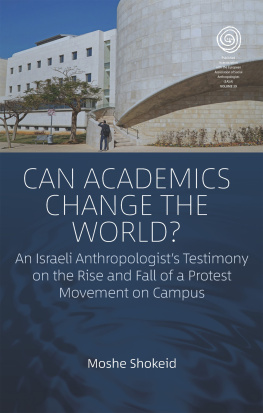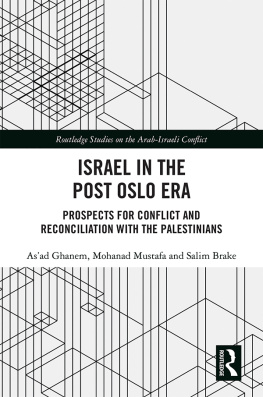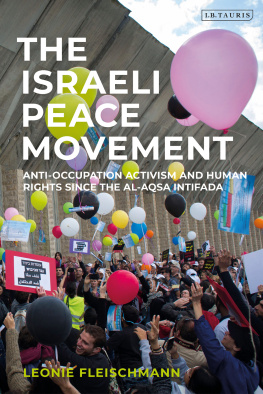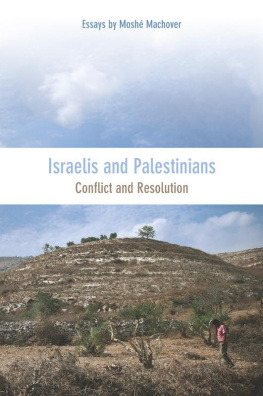CAN ACADEMICS CHANGE THE WORLD?
EASA Series
Published in Association with the European Association of Social Anthropologists (EASA)
Series Editor: Aleksandar Bokovi, University of Belgrade
Social anthropology in Europe is growing, and the variety of work being done is expanding. This series is intended to present the best of the work produced by members of the EASA, both in monographs and in edited collections. The studies in this series describe societies, processes, and institutions around the world and are intended for both scholarly and student readership.
Recent volumes:
39. CAN ACADEMICS CHANGE THE WORLD?
An Israeli Anthropologists Testimony on the Rise and Fall of a Protest Movement on Campus
Moshe Shokeid
38. INSTITUTIONALISED DREAMS
The Art of Managing Foreign Aid
Elbieta Drkiewicz
37. NON-HUMANS IN AMERINDIAN SOUTH AMERICA
Ethnographies of Indigenous Cosmologies, Rituals and Songs
Edited by Juan Javier Rivera Anda
36. ECONOMY, CRIME AND WRONG IN A NEOLIBERAL ERA
Edited by James G. Carrier
35. BEING-HERE
Placemaking in a World of Movement
Annika Lems
34. EXPERIMENTAL COLLABORATIONS
Ethnography through Fieldwork Devices
Edited by Adolfo Estalella and Toms Snchez Criado
33. BACK TO THE POSTINDUSTRIAL FUTURE
An Ethnography of Germanys Fastest-Shrinking City
Felix Ringel
32. MESSY EUROPE
Crisis, Race, and Nation-State in a Postcolonial World
Edited by Kristn Loftsdttir, Andrea L. Smith, and Brigitte Hipfl
31. MANAGING AMBIGUITY
How Clientelism, Citizenship, and Power Shape Personhood in Bosnia and Herzegovina
arna Brkovi
For a full volume listing, please see the series page on our website:https://www.berghahnbooks.com/series/easa
CAN ACADEMICS CHANGE THE WORLD?
An Israeli Anthropologists Testimony on the Rise and Fall of a Protest Movement on Campus
Moshe Shokeid
First published in 2020 by
Berghahn Books
www.berghahnbooks.com
2020 Moshe Shokeid
All rights reserved. Except for the quotation of short passages for the purposes of criticism and review, no part of this book may be reproduced in any form or by any means, electronic or mechanical, including photocopying, recording, or any information storage and retrieval system now known or to be invented, without written permission of the publisher.
Library of Congress Cataloging-in-Publication Data
Names: Shokeid, Moshe, author.
Title: Can Academics Change the World? An Israeli Anthropologists Testimony on the Rise and Fall of a Protest Movement on Campus / Moshe Shokeid.
Other titles: EASA series; v. 39.
Description: First edition. | New York: Berghahn Books, 2020. | Series: EASA series; vol. 39 | Includes bibliographical references and index.
Identifiers: LCCN 2020006103 (print) | LCCN 2020006104 (ebook) | ISBN 9781789206982 (hardback) | ISBN 9781789206999 (ebook)
Subjects: LCSH: Shokeid, Moshe. | Ad Kan (Organization) | Universiat Tel-Aviv. | College teachersPolitical activityIsraelTel Aviv. | Protest movementsIsraelTel Aviv. | AnthropologistsIsraelBiography. | College teachersIsraelBiography. | Palestinian ArabsPolitics and government. | Arab-Israeli conflict.
Classification: LCC LG341.T47 S5 2020 (print) | LCC LG341.T47 (ebook) | DDC 378.1/981095694dc23
LC record available at https://lccn.loc.gov/2020006103
LC ebook record available at https://lccn.loc.gov/2020006104
British Library Cataloguing in Publication Data
A catalogue record for this book is available from the British Library
ISBN 978-1-78920-698-2 hardback
ISBN 978-1-78920-699-9 ebook
To:
AD KAN activists,
colleagues and comrades in protest
Contents
Illustrations
Preface
The following chapters, relaying the evolution of a protest movement, represent a somewhat unusual document in the record of my ethnographic research engagements. It is also equally uncommon in the tradition of anthropological reports. I graduated from the Manchester School of Anthropology during the late 1960s, where my instructor, Max Gluckman, used to tell his students before departure to the field, Have your data right. True, these were the days before the era of reflexivity and critical analysis that have transformed the style of ethnographic writings, challenging the authority of subjectivity and the endurance of the ethnographers facts. Thus, there was ample space for the practitioners revelations about their own personal experiences and feelings in the field, from Turnbulls The Mountain People (1972) and Rabinows Reflections on Fieldwork in Morocco (1977) to Geertzs After the Fact (1995).
Contrary to the norms of my old school, the present ethnographic material is significantly based on my participation as chief informant in the ethnographic scene under investigation. Consequently, the ethnographer combines the dual identity of researcher and subject. It calls to mind the moving testimony I Will Bear Witness (1998) by Klemperer, the German linguist whose diaries produced a monumental ethnography about Jewish life under the Nazi regime. Though this book is no comparison with Klemperers horrific experiences and agonizing narrative, I take the liberty of employing the anthropologists toolkit and private persona to testify about my own society, stepping out of the normative, mainstream professional task to bear witness to other societies. Incidentally, this research procedure connects with a recent discourse about the parallel worlds of ethnography and biography.1 However, my testimony integrates the reports and discourses exposed by other Israeli researchers and critics representing various vocational perspectives.
It took me a long time to take on the role that seems to extol the anthropologist as major protagonist. No doubt, the founding of the state of Israel presents a unique story in world history, a consequential outcome of the major events that reconstructed global politics, society, and culture during the twentieth century. Israeli scholars, anthropologists included, have been raised under the national banner and vision, but they are simultaneously expected to prove that they are accomplished citizens of the Western Euro-American scientific world. Indeed, to this day, publications in Hebrew weigh less in considerations of academic appointments and promotions.
Israeli anthropologists who were first recruited and promoted by a research project under the leadership of Gluckman (see Shokeid 2004), but who also came from other schools, have mostly investigated Israeli communal-ethnic-cultural issues. They thus deviated from their Euro-American colleagues dominating field-sites and anthropological concerns, typically engaged in other, third-world societies. In any case, my subject today, though signifying the tradition of research at home, deviates again both in method and ethnographic mission. The initial field-site, a protest group at Tel Aviv University campus, but also its wider ethnographic objective makes inquiries into Israeli academics terms of engagement and disengagement in view of acute national sociopolitical issues: in particular, the continuing tragic conflict with the Palestinians.










